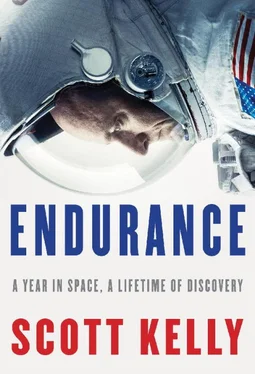I wake up my last morning on Earth at around seven. I spend the morning looking through all of my bags—one to meet me in Kazakhstan, others to send back to Houston. The logistics are strange: What do I want to have with me when I first land? What will I not need until later? Did I make sure to write down my credit card and account numbers for things like my utilities and bank? It’s hard enough to deal with these sorts of details on Earth, but I need to be prepared to avoid defaulting on my mortgage, as well as to buy Amiko and the girls presents, from space.
My last earthly breakfast is a Baikonur attempt at American cuisine: runny eggs (because I could never make the Kazakh cook understand the term “over medium”), toast, and “breakfast sausages” (actually microwaved hot dogs). Getting ready on the day of launch takes much longer than you’d think it would, like so many aspects of spaceflight. First I take a final trip to the banya to relax, then go through the preflight enema ritual—our guts shut down in space initially, so the Russians encourage us to get things cleaned out ahead of time. The cosmonauts have their doctors do this, with warm water and rubber hoses, but I opt for the drugstore type in private, which lets me maintain a comfortable friendship with my flight surgeon. I savor a bath in the Jacuzzi tub, then a nap (because our launch is scheduled for 1:42 a.m. local time). When I wake, I take a shower, lingering awhile. I know how much I’ll miss the feeling of water for the next year.
The Russian flight surgeon we call “Dr. No” shows up shortly after I’m out of the shower. He is called Dr. No because he gets to decide whether our families can see us once we’re in quarantine. His decisions are arbitrary, sometimes mean-spirited, and absolute. He is here to wipe down our entire bodies with alcohol wipes. The original idea behind the alcohol swab-down was to kill any germs trying to stow away with space travelers, but now it seems like just another ritual. After a champagne toast with senior management and our significant others, we sit in silence for a minute, a Russian tradition before a long trip. As we leave the building, a Russian Orthodox priest will bless us and throw holy water into each of our faces. Every cosmonaut since Yuri Gagarin has gone through each of these steps, so we will go through them, too. I’m not religious, but I always say that when you’re getting ready to be rocketed into space, a blessing can’t hurt.
We do a ceremonial walkout past the media with a traditional Russian song playing, “Trava u doma,” a song about cosmonauts missing home that sounds like a Soviet marching band playing at a carnival:
And we don’t dream of the cosmodrome’s roar
Nor of this icy dark blue
Instead, we dream of the grass, the grass near our homes…
The green, green grass.
We get on the bus that will take us to the building where we get suited up. The moment the door to the bus closes behind us, a rope holding back the crowd is cut, and everyone rushes forward. It’s chaotic, and I can’t spot my family at first, but then I see them, in the front row—Amiko, Samantha, Charlotte, and Mark. Someone lifts up Charlotte, who is eleven, so she can put her hand on the window, and I put my hand up to hers, trying to look happy. Charlotte is smiling, her round white face in a grin. If she’s sad that she won’t see me for a year, if she’s scared to watch me leave Earth on a barely controlled bomb, if she’s aware of the many types of peril I will face before I get to hug her again a year from now, she doesn’t show it. Then she’s down on the asphalt again, standing with the rest of them and waving. I see Amiko smiling, though I can also see tears in her eyes. I see Samantha, who is twenty. Her wide smile betrays her apprehension for what is to come. And then the bus’s brakes release with a hissing scream, and we are gone.
—
I SIT ON a cheap leather couch waiting to suit up in Building 254, a thirty-minute drive from Saddam’s Palace. A flat-screen in the corner shows a silly Russian TV show that none of us pay attention to. There is some food laid out—cold chicken, meat pies, juice, and tea—and though it isn’t what I would have chosen as my last earthly meal for a year, I eat a bit.
First Gennady is called into an adjacent room to strip down and put on his diaper, cardiac electrodes, and a fresh pair of white long underwear (meant to absorb sweat and shield us from the rubber of the Sokol suit). When Gennady returns, Misha goes in to diaper up. Then I go. Whenever I do this, I chuckle to myself that I wouldn’t have thought I’d be in diapers again until much later in life. It’s now time to get our Sokol suits on. We have white-coated, surgical-masked Russian specialists to help us get dressed. They expertly close the openings in our suits with a series of folds and the peculiar rubber bands.
The three of us walk into another room, which is divided by a sheet of glass. On the other side are our families, managers from the Russian space agency (Roscosmos), NASA leaders, and members of the media, sitting in rows of seats facing us. I know the closest analogy should be a NASA press conference, but this moment has always made me feel like a gorilla in the zoo instead.
I immediately spot Amiko, Mark, and my daughters in the front row. Amiko and the girls have been here for a few days, but Mark only just arrived. They all smile at me and wave. Not for the first time, I’m grateful that my brother is there for them. As an experienced astronaut himself, and someone who knows me better than anyone else, he can help them understand what will be going on, and reassure them when necessary, better than anyone else could.
Amiko smiles happily and points to the pendant I had made for her before I left Houston, a silver version of the Year in Space mission patch. Samantha and Charlotte wear the silver pendants too. I will bring a second version of the pendants, in gold with sapphires set into them, with me to give the three of them when I return. Amiko’s smile is sincere and happy, but because I know her so well I can also see that she is tired, not only from jet lag but also from the strain. This is Amiko’s second time going through the process of preparing for a long-duration mission with me, so she’s known what to expect, though I’m not sure that makes it any easier. She also works for NASA, in the public affairs office, so she knows better than most astronauts’ partners what I am facing on this mission. In some instances this knowledge will be comforting, but more often than not—including today—it would have been less stressful to know less.
Amiko was an acquaintance for a long time. She’d worked closely with my brother on a project and also shared mutual friends with my ex-wife, Leslie. In early 2009, Amiko and I both filed for divorce, each unbeknownst to the other, and by coincidence we ran into each other a few times many months later. Amiko says she remembers one of those nights being impressed that though I had jokingly acknowledged she was attractive, I’d turned down a chance to get in the hot tub with her and some other people in favor of going to bed early for a training event in the morning. A few weeks later, I saw her again at a party, and this time I did wind up in the hot tub with her. We talked all night, but again she was impressed that I didn’t make any advances. Anyone who has seen Amiko knows that she has to deal with a lot of attention from men, and I guess I stood out for trying to get to know her as a person. But I’m not an idiot—I did make sure to get her phone number that night.
I’m always curious about how people end up doing what they do, especially when they seem to be especially good at it, as Amiko is. She struck me as different from a lot of the people who work for NASA public affairs, some of whom can be conservative about new ideas and resistant to change. I asked her about how she came to her career, and though she told me only a bit of her history it was pretty compelling. Kicked out of her house at fifteen for standing up to her mother’s physical abuse, with nothing but the clothes on her back, married at eighteen, and with two kids by twenty-three, she got a job as a NASA secretary. From the moment she was hired, she began working toward getting into the agency’s competitive employee education program, in which NASA pays for promising employees to take college classes. Once Amiko was chosen, she began taking the maximum credits possible every semester while working full-time and raising her two small boys. She finished her degree in communications with a perfect GPA and every honor given to undergraduates. I had known she was smart and capable, but the more I learned about her life story, the more impressed I was with her. Her two sons, by that point in high school, were doing well, and she continued to set new challenges for herself. Most people would not have gotten past the setbacks she’d faced, but through intelligence, grit, and fierce determination, she had made the life for herself that she wanted. I could tell she wouldn’t easily change that life for any man, even for an astronaut being as charming as he could.
Читать дальше












